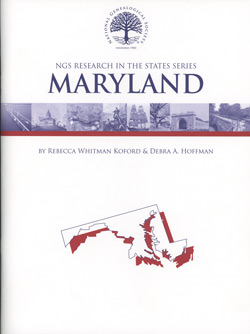Research in Maryland – a NGS Research in the States series guide; NGS Special Publication Number 137 by Rebecca Whitman Koford, CG, CGL and Debra A. Hoffman, PLCGS; GUGA, FVGS; 2021; Soft Cover; Saddle Stapled; 8.5 x 11; 54 pp; ISBN: 978-1-935815-50-1; Item #: NGS40; $20
Research in Maryland is a newly revised guidebook for family historians who seek to trace ancestors who lived in Maryland as well as lands that were once part of the “Maryland Colony,” including Delaware, the District of Columbia, Pennsylvania as far north as Philadelphia, and parts of what are Virginia and West Virginia. Disputes with adjacent colonies and later states over its borders were not settled until the twentieth century.
In pre-colonial times, Maryland was home to indigenous people from the Algonquins, Iroquois, and Siouan language groups. The Powhatan Confederacy, part of the Algonquin people, was the largest. The colonial period began in 1634, two years after King Charles I bestowed the land on the 2nd Baron Baltimore. During the next hundred years, it would be populated by Europeans primarily from England and Germany, indentured servants, English convicts, free Blacks, and enslaved people.
Co-authored by Rebecca Whitman Koford, CG, CGL, and Debra A. Hoffman, PLCGS, Research in Maryland explains the system of land grants during the colonial period as well as after America’s independence. They also discuss Maryland’s court system and its numerous name and jurisdictional changes during and after the colonial period.
Maryland’s state and local governments did not begin to keep records of births and deaths until the late nineteenth century. Accessing religious records may prove helpful to genealogists. The authors review where family historians can locate church records for Anglican/Episcopalian, Baptist, Lutheran and Reformed, Methodist, Roman Catholic, and Quaker religions. Due to political forces that disenfranchised Catholics and Quakers, few of their pre-Revolutionary records still exist. Other derivative resources for missing vital records are ethnic records. The guide book discusses source material for several ethnic groups, including African American, German, Irish, Jewish, and Native Americans.
Research in Maryland describes the resources at Maryland State Archives (MSA) and its initiative, Archives of Maryland Online, which includes more than 471,000 historical documents. The book provides an overview of other state repositories; archives, societies, and libraries; cemetery, census, military, tax, and voter records; and the various, historical records on women. Other valuable resources are also covered in this concise guidebook.
Published by NGS, Research in Maryland is one volume in the Research in the States series edited by Barbara Vines Little, CG®, FNGS, FVGS.
To read a full Table of Contents for the book, and/or to order, See: https://www.familyrootspublishing.com/store/product_view.php?id=3846
